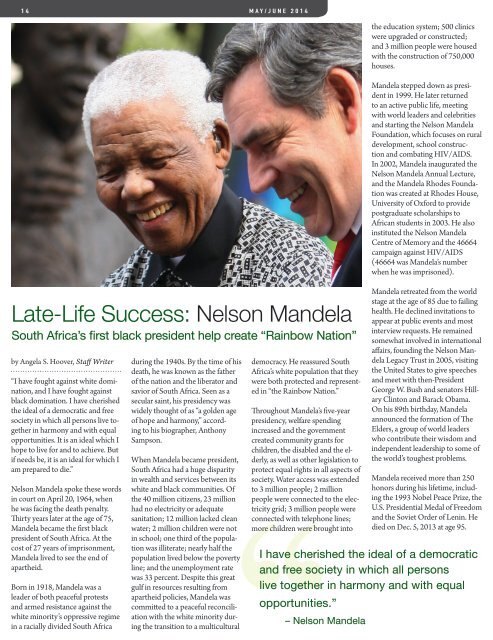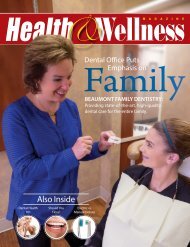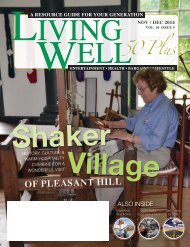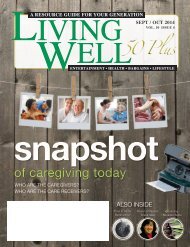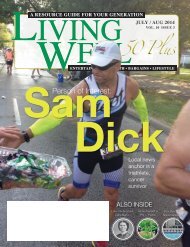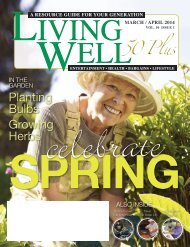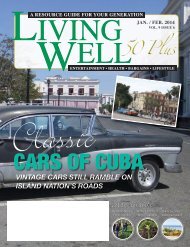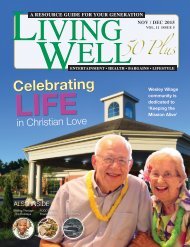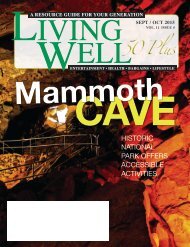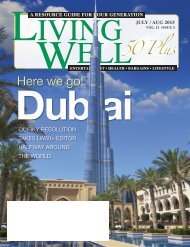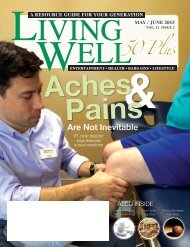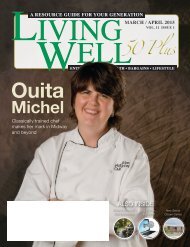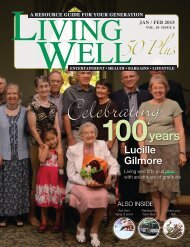Living Well 60+ May-June 2014
Create successful ePaper yourself
Turn your PDF publications into a flip-book with our unique Google optimized e-Paper software.
1 4 MAY/JUNE 2 0 1 4<br />
Late-Life Success: Nelson Mandela<br />
South Africa’s first black president help create “Rainbow Nation”<br />
by Angela S. Hoover, Staff Writer<br />
“I have fought against white domination,<br />
and I have fought against<br />
black domination. I have cherished<br />
the ideal of a democratic and free<br />
society in which all persons live together<br />
in harmony and with equal<br />
opportunities. It is an ideal which I<br />
hope to live for and to achieve. But<br />
if needs be, it is an ideal for which I<br />
am prepared to die.”<br />
Nelson Mandela spoke these words<br />
in court on April 20, 1964, when<br />
he was facing the death penalty.<br />
Thirty years later at the age of 75,<br />
Mandela became the first black<br />
president of South Africa. At the<br />
cost of 27 years of imprisonment,<br />
Mandela lived to see the end of<br />
apartheid.<br />
Born in 1918, Mandela was a<br />
leader of both peaceful protests<br />
and armed resistance against the<br />
white minority’s oppressive regime<br />
in a racially divided South Africa<br />
during the 1940s. By the time of his<br />
death, he was known as the father<br />
of the nation and the liberator and<br />
savior of South Africa. Seen as a<br />
secular saint, his presidency was<br />
widely thought of as “a golden age<br />
of hope and harmony,” according<br />
to his biographer, Anthony<br />
Sampson.<br />
When Mandela became president,<br />
South Africa had a huge disparity<br />
in wealth and services between its<br />
white and black communities. Of<br />
the 40 million citizens, 23 million<br />
had no electricity or adequate<br />
sanitation; 12 million lacked clean<br />
water; 2 million children were not<br />
in school; one third of the population<br />
was illiterate; nearly half the<br />
population lived below the poverty<br />
line; and the unemployment rate<br />
was 33 percent. Despite this great<br />
gulf in resources resulting from<br />
apartheid policies, Mandela was<br />
committed to a peaceful reconciliation<br />
with the white minority during<br />
the transition to a multicultural<br />
democracy. He reassured South<br />
Africa’s white population that they<br />
were both protected and represented<br />
in “the Rainbow Nation.”<br />
Throughout Mandela’s five-year<br />
presidency, welfare spending<br />
increased and the government<br />
created community grants for<br />
children, the disabled and the elderly,<br />
as well as other legislation to<br />
protect equal rights in all aspects of<br />
society. Water access was extended<br />
to 3 million people; 2 million<br />
people were connected to the electricity<br />
grid; 3 million people were<br />
connected with telephone lines;<br />
more children were brought into<br />
the education system; 500 clinics<br />
were upgraded or constructed;<br />
and 3 million people were housed<br />
with the construction of 750,000<br />
houses.<br />
Mandela stepped down as president<br />
in 1999. He later returned<br />
to an active public life, meeting<br />
with world leaders and celebrities<br />
and starting the Nelson Mandela<br />
Foundation, which focuses on rural<br />
development, school construction<br />
and combating HIV/AIDS.<br />
In 2002, Mandela inaugurated the<br />
Nelson Mandela Annual Lecture,<br />
and the Mandela Rhodes Foundation<br />
was created at Rhodes House,<br />
University of Oxford to provide<br />
postgraduate scholarships to<br />
African students in 2003. He also<br />
instituted the Nelson Mandela<br />
Centre of Memory and the 46664<br />
campaign against HIV/AIDS<br />
(46664 was Mandela’s number<br />
when he was imprisoned).<br />
Mandela retreated from the world<br />
stage at the age of 85 due to failing<br />
health. He declined invitations to<br />
appear at public events and most<br />
interview requests. He remained<br />
somewhat involved in international<br />
affairs, founding the Nelson Mandela<br />
Legacy Trust in 2005, visiting<br />
the United States to give speeches<br />
and meet with then-President<br />
George W. Bush and senators Hillary<br />
Clinton and Barack Obama.<br />
On his 89th birthday, Mandela<br />
announced the formation of The<br />
Elders, a group of world leaders<br />
who contribute their wisdom and<br />
independent leadership to some of<br />
the world’s toughest problems.<br />
Mandela received more than 250<br />
honors during his lifetime, including<br />
the 1993 Nobel Peace Prize, the<br />
U.S. Presidential Medal of Freedom<br />
and the Soviet Order of Lenin. He<br />
died on Dec. 5, 2013 at age 95.<br />
I have cherished the ideal of a democratic<br />
and free society in which all persons<br />
live together in harmony and with equal<br />
opportunities.”<br />
– Nelson Mandela


